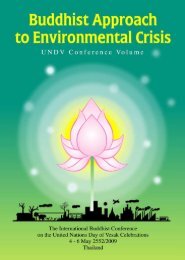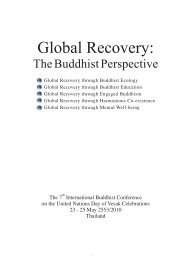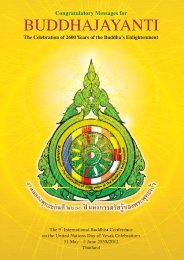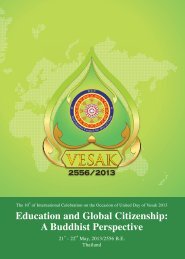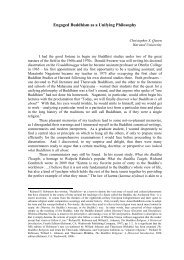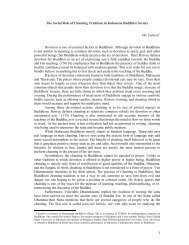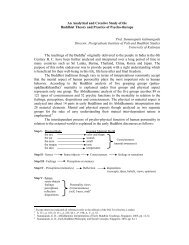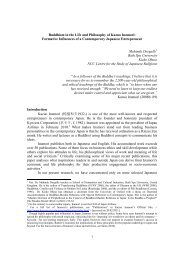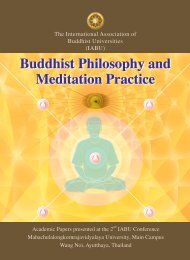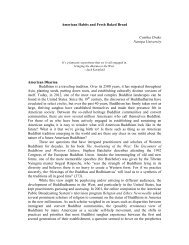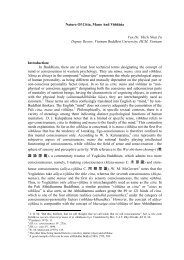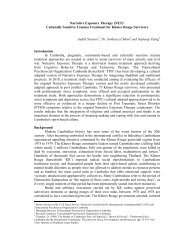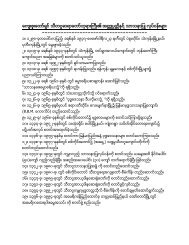Pratityasamutpada in Eastern and Western Modes of Thought ...
Pratityasamutpada in Eastern and Western Modes of Thought ...
Pratityasamutpada in Eastern and Western Modes of Thought ...
You also want an ePaper? Increase the reach of your titles
YUMPU automatically turns print PDFs into web optimized ePapers that Google loves.
eality is diametrically opposed to one <strong>of</strong> the key concepts <strong>of</strong> traditional Indian<br />
metaphysics: ‘svabhava’ or ‘own be<strong>in</strong>g’.<br />
The second aspect <strong>of</strong> Nagarjuna’s philosophy is an answer to the <strong>in</strong>ner<br />
contradictions <strong>of</strong> four extreme modes <strong>of</strong> thought which are not exhaustively presented by<br />
Nagarjuna but only <strong>in</strong>dicated <strong>in</strong> pr<strong>in</strong>ciple. This is not only a debate with<strong>in</strong> the traditional<br />
metaphysics <strong>of</strong> India because the pr<strong>in</strong>ciples can be related to our extreme modes <strong>of</strong><br />
thought that make it impossible for us to recognize the nature <strong>of</strong> reality. I relate the four<br />
extreme propositions to the substantial, subjective, holistic <strong>and</strong> <strong>in</strong>strumentalist modes <strong>of</strong><br />
thought found <strong>in</strong> the modern world. In order to effectively demonstrate that these modes<br />
<strong>of</strong> thought are unsusta<strong>in</strong>able, at first we have to recognize them as such. Therefore,<br />
without <strong>in</strong>tend<strong>in</strong>g to be complete, a brief outl<strong>in</strong>e <strong>of</strong> the four modes <strong>of</strong> thought will follow.<br />
(1) Substantialism<br />
Substance is someth<strong>in</strong>g that has <strong>in</strong>dependent existence. 5 In Europe, substantialism<br />
is at the center <strong>of</strong> traditional metaphysics, beg<strong>in</strong>n<strong>in</strong>g with pre-Socratic philosophers (like<br />
Parmenides <strong>and</strong> Heraclitus, two critics <strong>of</strong> substantial thought) via Plato right up to<br />
Immanuel Kant. Accord<strong>in</strong>g to traditional metaphysics, substance or own be<strong>in</strong>g is<br />
someth<strong>in</strong>g that has <strong>in</strong>dependent existence, someth<strong>in</strong>g unchangeable, eternal <strong>and</strong> exist<strong>in</strong>g<br />
by itself. Substance is the underly<strong>in</strong>g basis for the entire non-material foundation <strong>of</strong> the<br />
world <strong>in</strong> which we live. Plato made a dist<strong>in</strong>ction between two forms <strong>of</strong> be<strong>in</strong>g: particularly<br />
<strong>in</strong> the second part <strong>of</strong> his Parmenides he dist<strong>in</strong>guished between, on the one h<strong>and</strong>, s<strong>in</strong>gular<br />
objects which exist exclusively through participation without own be<strong>in</strong>g <strong>and</strong>, on the other<br />
h<strong>and</strong>, ideas that do have own be<strong>in</strong>g.<br />
Traditional metaphysics adopted Plato’s dualism. An <strong>in</strong>dependent own be<strong>in</strong>g is<br />
characterized <strong>in</strong> traditional metaphysics as someth<strong>in</strong>g that, as an exist<strong>in</strong>g th<strong>in</strong>g, is not<br />
dependent on anyth<strong>in</strong>g else (Descartes); is exist<strong>in</strong>g by itself <strong>and</strong> subsist<strong>in</strong>g through itself<br />
(More); is completely unlimited by others <strong>and</strong> free from any k<strong>in</strong>d <strong>of</strong> foreign comm<strong>and</strong><br />
(Sp<strong>in</strong>oza); <strong>and</strong> exists <strong>of</strong> itself without anyth<strong>in</strong>g else (Schell<strong>in</strong>g). In traditional<br />
metaphysics, the highest substance was <strong>of</strong>ten understood as God or as a div<strong>in</strong>e be<strong>in</strong>g.<br />
S<strong>in</strong>ce Kant’s so called ‘Copernican Revolution’ the primary question <strong>of</strong> philosophy is no<br />
longer to know reality, but rather to know the m<strong>in</strong>d or the source <strong>of</strong> perception <strong>and</strong><br />
knowledge. For this reason the traditional metaphysics has lost ground <strong>in</strong> the modern<br />
world. In fact the central concepts <strong>of</strong> the traditional metaphysics, such as be<strong>in</strong>g, substance,<br />
reality, essence, etc. have been replaced by the reductionist modes <strong>of</strong> thought <strong>of</strong> modern<br />
sciences. Now atoms, elementary particles, energy, fields <strong>of</strong> force, laws <strong>of</strong> nature etc., are<br />
seen as the fundamental ground for everyth<strong>in</strong>g else.<br />
(2) Subjectivism<br />
By subjectivist modes <strong>of</strong> thought I underst<strong>and</strong> the turn<strong>in</strong>g <strong>of</strong> attention to the<br />
subject that resulted from the changes created by René Descartes. Accord<strong>in</strong>g to his<br />
doctr<strong>in</strong>e, consciousness is primarily existent <strong>and</strong> everyth<strong>in</strong>g else is sheer content or a<br />
form or a creation <strong>of</strong> the consciousness. The high po<strong>in</strong>t <strong>of</strong> this k<strong>in</strong>d <strong>of</strong> subjectivism is<br />
represented by the idealism <strong>of</strong> Berkeley while the ideas <strong>of</strong> Kant can be considered as a<br />
moderated subjectivism or idealism. Hans-Georg Gadamer emphasizes that subjectivity<br />
or self-awareness has become the fulcrum <strong>of</strong> modern philosophical thought which<br />
provides for evidential pro<strong>of</strong> <strong>and</strong> certa<strong>in</strong>ty. This view has been cont<strong>in</strong>ually brought <strong>in</strong>to<br />
doubt by the modern physical sciences. However, the doubts have not lead to a new <strong>and</strong><br />
complementary view <strong>of</strong> reality but to a fatal separation <strong>of</strong> philosophy <strong>and</strong> the modern<br />
5 Webster’s New World Dictionary, New York. 1968.



